PostClassic: December 2007 Archives
I love reading David Mamet's essays while I'm composing, because he so trenchantly exhorts the artist to be honest, to limit him- or herself to moves that advance the action of the piece, and to avoid the chicanery of poetic touches that do not carry the action forward. I suppose I love it all the more because what constitutes chicanery in music is not exactly what constitutes it in theater or film, thus I get to interpret his exhortations to fit my comfort level. And his observations of the artistic world are much in sync with mine. From Bambi Vs. Godzilla, in a discussion about getting graduate degrees in filmmaking:
Of what use is this graduate film diploma, then? As evidence of the bona fides of the applicant. For someone capable of putting up with X years of the nonsense of school would be odds-on willing to submit to the sit-down-and-shut-up rigors of the bureaucratic environment.
Perhaps, then, this graduate course functions, whether through design or happy accident, not to train but to certify house slaves.
A former student expressed frustration with the hoops that grad schools were putting her through for admission, but added, "Well, I guess this is how they winnow out the weak." No no, I told her, the purpose of grad school is to winnow out the disobedient, those who have minds of their own and refuse to squelch them.
More from a few pages later:
Helpful hints to the filmmaker and the viewer: The compliments - "What visuals!" "What craft!" "What use of the camera!" and "What technique!" - all mean "the script stinks."
We use a couple of those in music, too, to which I could add, "The orchestration was amazing!" - which, correctly translated, means, "I have no idea what that piece was trying to do."
I also like this. Mamet warns against the idiocy of audience-testing a film with people who know their opinion may spur the producer to make changes, and also against the unreality of trusting any reaction from work shown to one's friends or colleagues in an academic setting.
Is it necessary to gauge the audience? Sure thing. The way to do it is to sit in the back of the theater while the film is being screened and watch their reactions when their attention is off themselves; that's the way to see if the film, and any section of it, works or fails.
This is also how I get the most solid feedback about my own music, and a technique I habitually used as a critic to judge how music was going over - tremendously more reliable than asking people's opinions at intermission.
Ha! Alex Ross can take a holiday hiatus, but here at Postclassic, the all-important week between Christmas and New Year's is when we get moving. I am pleased to announce that the official web site for the Society for Minimalist Music went online yesterday. Its first offerings include seven downloadable papers delivered at the first international minimalism conference in Wales that I blogged about, including several of the best papers I heard there:
Triadic Transformation and Harmonic Coherence in the Music of Gavin Bryars, by Scott Alexander Cook
An Examination of Minimalist Tendencies in Two Early Works by Terry Riley Wednesday, by Ann Glazer Niren [the two works in question being his almost unknown String Trio and String Quartet from around 1960)
Steve Reich: stories of machines and minimalism, by John Pymm
Sudoku Music: Systems and Readymades, by Christopher Hobbs (with musical excerpts)
British Readymades and Systems Music, by Virginia Anderson (the last word on systems music versus minimalism terminology)
1976 and All That: Minimalism and Post-Minimalism, Analysis and Listening Strategies, by Keith Potter (the keynote address)
Parallel Symmetries? Exploring Relationships between Minimalist Music and Multimedia Forms, by Pwyll ap Siôn & Tristian Evans (who organized the festival; in addition, Pwyll is author of a fine new book on Michael Nyman)
You may feel free to make the usual reflexive comments about the alleged absurdity of translating such accessible music into academese, but it's all part of a historical process, and this is true progress. As someone whose college professors tried to convince him that minimalism was a hoax, I find it rather thrilling.
Hans Otte, the German postminimalist composer of the piano magnum opus Das Buch der Klänge (1979-82), has just died. I never knew much about him - Bill Duckworth was a mutual friend, and informed me - but Das Buch der Klänge is a lovely work, one I've played on Postclassic Radio. I gather Otte was not prolific, and was best known as an innovative radio producer for Radio Bremen.
And lo, in the last days even he who had forever sworn that he would rather have his eyeballs penetrated with vanadium wires than own a cell phone will relent, and choose ringtones.- Nostradamus
For Christmas I asked for, and received, a cell phone, which officially means that every adult, child, and household pet in America now has one, since I was determined to be the last holdout. But I got too tired of people who asked for my cell phone number looking at me as though I had shown up at their formal party in knee breeches, or had just cooked the last surviving panda for dinner - in short, the way I've always looked at people who won't do business by e-mail. I'm a writer, and I prefer to communicate by writing, in which medium I have hardly ever lost an argument. But you'll never get my cell phone number, never. Dick Cheney has it, and a couple of composers so obscure that they may need emergency PR, but the point is not so I can be reached, but so that I may reach. Got a question, send me an e-mail.
David Mamet in his wonderful new book Bambi vs. Godzilla:
Every [film] studio pays myriads of number crunchers, market analysts, and various other experts to predict and strategize. The breakaway hits, however, have usually been films that were originally discarded as "too.""Too" what? What matter? Too original, too predictable, too mature, too infantile, too genre, not sufficiently genre, etcetera.
I am reminded of what I wrote in a free-lance definition of Downtown music:
The only thing that all Downtown music might be said to have in common is that, at least at the time of its original appearance, it was too outré - by dint of excessive length, stasis, simplicity, extemporaneity, consonance, noisiness, pop influence, vernacular reference, or other purported infraction - to have been considered "serious" modern music....
Mamet's right: "Downtown" is unnecessary. The correct and adequate term is too.
I interrupt the ongoing aesthetics marathon to bring you breaking news of David McIntire's cat Rassia, the latest cat to finish my book.
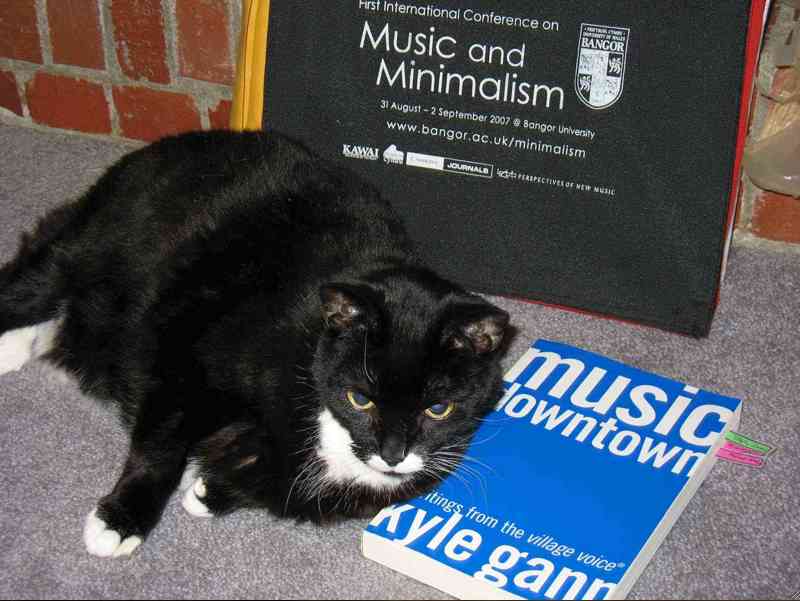
Rassia doesn't seem to have suffered the ill effects of Corey Dargel's cat - perhaps because her interest in Downtown music is only academic, as evidenced by her tote bag from the recent minimalism conference. David McIntire and I will codirect the second minimalism conference in August 2009 - or is it Rassia and I?
God, where will this all end?
Back to serious blogging after Christmas.
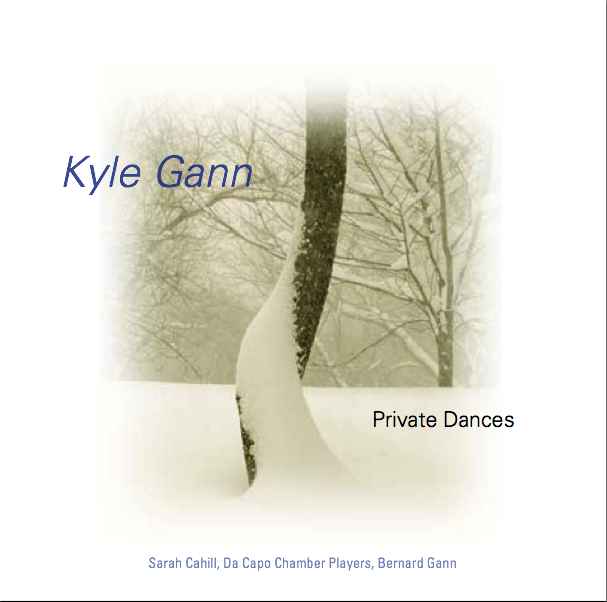 A copy of my new CD on the New Albion label, Private Dances, has just been handed to me. The official release date is January 22. My stuff never seems to get out quite in time for Christmas (this happened with Music Downtown two years ago too), but then, I'm not much for participating in American commercialism anyway. I guess.
A copy of my new CD on the New Albion label, Private Dances, has just been handed to me. The official release date is January 22. My stuff never seems to get out quite in time for Christmas (this happened with Music Downtown two years ago too), but then, I'm not much for participating in American commercialism anyway. I guess.
Contents:
Private Dances (2000/4), played by Sarah Cahill
Hovenweep (2000), played by Da Capo
Time Does Not Exist (2000), played by S.C.
The Day Revisited (2005), played by Da Capo with myself and Bernard Gann
On Reading Emerson (2006), S.C. again
We recorded at the Fisher Center (Frank Gehry-designed) at Bard, Tom Lazarus engineered the sound, and I'm tickled as punch with the sound quality. Sarah plays gorgeously. I'm greatly indebted to Foster Reed for his enthusiasm toward the project. Getting a CD out always seems to free up psychic room for new work.
[Updated below] I'll get back to cats later. First, Samuel Vriezen has responded to my last post on Arthur Danto so thoughtfully that I'm moving the discussion to the blog proper (you may have already read the first exchange):
* * * * * * * * * * * * *
Samuel: OTOH, when I read "is that there is really no art more true than any other" I find that just as tiresome as some modernist rant against downtown music or whatever. To me, such a statement belongs to an era that I don't want to live in: the great age of indifference. We just have to hold some art to be selfevidently true, because we have to believe in something. At least I'm not writing the music I am writing because I think any other old style would suit me just the same! Most of those styles out there actually bore me to death, and that's exactly why I write what I write! So I think some works are worth my attention more than others. I wouldn't be against calling the worthier ones more true. Some idea are great, others are stupid and boring, and that's what truth is about.
Danto is correct, though, that such preferences can't be philosophically grounded as such. Philosophy is entirely incapable of saying what idea is great and what idea is stupid. No such criteria can be supplied. And if people do go and supply such criteria (stuffy twelvetoners or whoever), you get academicism and boredom. But we CAN say that anything boring can't be as true as anything exciting in art.
For me, the conclusion must be that if you stick to philosophy to make your judgments, you're indeed going to forego making the distinction between the exciting and the lukewarm. But in this case, I'd rather chuck out what is called "philosophy" here.
KG replies: Samuel, if the quote were "there is really no art more *good* than any other," or "no style more *fertile* than any other," I'd agree completely that both are false. But when I was young, there were styles that I would have considered "not true" that nevertheless produced pieces I came to admire. I never cared for Barber's sentimental neoromanticism - but I sure like "Knoxville: Summer of 1915." And I always had the same philosophical distaste for neoclassicism that Cowell did, but I eventually had to admit that Stravinsky wrote some damn good pieces in it. In my personal opinion serialism was a lie, but I'll listen to Maderna's Grande Aulodia any day. It seems easier to make a superficial case for Zorn-type polystylistic music as being *truer* to the present day than totalism - but although I don't really know why I find totalism such a powerful response to the present, I am no less passionate about it for all that.
In short, I don't believe Danto's claim (taken out of context here, and perhaps I'm doing him a disservice quoting anything when people should really read the book themselves) leads to any era of indifference. Instead, I'd rather invoke what the economist Joseph Schumpeter said: "To realize the *relative* validity of one's convictions and yet stand for them unflinchingly is what separates the civilised man from the barbarian." I stand for my own musical idiom passionately and unflinchingly, here I stand I can do no other - but to claim that anyone besides myself, not situated as I am, must adopt it as well would strike me as intellectually fascist.
Samuel: Kyle, I certainly wouldn't want to argue for a coercive practice. But I do want to argue for truths in art.
If you were quoting Danto out of context, so I was not mentioning the philosophical context from which I'm thinking when I would argue for truth, which is the work of Badiou, who I've been reading recently. And based on what I learn from his writings, I would say that artistic truths exist; they are not such that everybody has to work that particular way, but they *are* such that everybody should recognize their value.
For example, the idea "Music can be written using non-hierarchical pitch structures" is true. It wasn't always so clear that this was true, but the works of Schoenberg and many others were investigations into how this particular truth can be thought, and they have shown that the claim above is in fact a truth. And in the sense that this thinkig of this idea in terms of works was very important - once the idea presents itself, you can't afford to just ignore it - Boulez was, in his particular moment, quite right to polemicize violently against musicians who didn't recognize the necessity of serial music.
So works of music can be investigations of how you can realize certain abstract ideas of what music can be, and that is exactly how in Badiou's theory artistic truth can be thought. Then, works that are part of such an investigation will be more true than works that are not part of any such "truth procedure".
Note that I formulated this truth of atonal music as "Music *can* be written using non-hierarchical pitch structures", and not as "Music *must* be written using non-hierarchical pitch structures". The former is quite clearly a truth, the latter is a travesty of truth, the kind of totalitarianism that any truth can engender, but which is to be avoided - in his Ethics, Badiou calls this a "disaster".
Even in the face of this danger of disaster, it's important to recognize that you sometimes come accross a truth and that whenever you do, you can't just pretend it's not there. And in that sense, yes, some works are more involved with truth than others. Schoenberg's 2nd quartet opens up possibilities for musical thinking, and I couldn't say the same for anything by, say, Christopher Rouse that I've heard. In that sense Schoenberg's work is part of the unfolding of a truth and Rouse's isn't. And Badiou allows me to think this idea and Danto doesn't.
My use of "truth" is perhaps a bit like your word "fertile", only I think it's worth considering that you can think that "fertility" on an abstract plane that deserves to be called "truth", because it's not just personal ("Music can be written using non-hierarchical pitch structures" is not merely true because I happen to feel that way, but because such music has in fact been composed.)
Now Feldman I find presents an interesting case compared to Boulez. Feldman often polemicized heavily against Boulez and indeed, against Boulez' coerciveness. And I would generally side with Feldman: I think the Cage circle drew the more fundamental conclusions from the truth of non-hierarchical organisation, and they seemed to do so in the absence of coercive artistic politics. However, I have been wondering about that latter bit. Feldman doesn't really proscribe in any of his writings that I've read what music you should write, but he's definitely presenting certain artistic attitudes as desirable and is very aggressive towards other attitudes, most clearly he's against Boulez. Was his work really free from coerciveness?
(Also, I've often found his music to have a very subtle aggression in it. Not in the pretty surface of course, but in the demands that it makes on you. Like, you've got to play a sound on the piano, but that sound really shouldn't have any attack in it. That's not really possible, only approachable - an attitude that can lead to magical experience, but that also does violence to what it means to play the piano.)
KG replies: You haven't said a thing I disagree with, and it's all amazingly well put, as usual. As Harry Partch said in an old out-of-print Columbia record, "This thing began with Truth, and Truth does exist." We just intonationists can hardly help being big believers that some rock-solid Truth does exist.
I guess, though, that I can't imagine a style which would contain no truth at all, which is why I gravitate to the more incremental word "fertile," rather than the black-or-white notions of truth and falsehood. For instance, if the truth of 12-tone music is that, "the derivation of all elements from the same 12-tone row guarantees some level of perceptual unity from the listener's point of view," then that's just false. As far as I'm concerned, it's totally discredited. OTOH (I've never used that abbreviation, but you're right, it did save me a lot of unnecessary typing), I find in serialism a truth that might be stated as: "applying permutational systems to several different aspects of music at once (pitch, rhythm, dynamics, and so on) facilitates the creation of exciting new counterintuitive textures that would have been difficult to arrive at by more intuitive means" - and I think that's absolutely true. It's not one of the great, universally applicable musical truths, like "3/2 is more consonant [easier to tune] than 49/33," or, "the reappearance of an A section after a contrasting B will create an impression of unity," but it's true. I would never write a 12-tone piece because the relatively petty truths inherent to the 12-tone idiom don't move me, don't seem *sufficiently* true or universal, aren't truths I would feel more valuable for having expressed - even though I'm well aware that a few 12-tone pieces have been written that transcended the idea of the style itself, and achieved real, touching beauty. I suppose to this extent I would grant you that Danto's phrase "there is really no art more true than any other" is rather overstated, at least taken out of context. Would that square us away? Although I think, *in* context, he simply means in the sense that something's either art or it's not. I think he's just saying, purely logically as befits a philosopher, that there is no universal criterion by which putative art can be banished from the realm of "real" art.
What interests me is that we're both instinctively locating Truth not just in individual works, but in styles, idioms. I think most musicians would rail against us for this (in a nasal, Pollyanna-ish tone: "there are no movements, there are only individual pieces"), and I think they're wrong. Because if a style is anything, it's a complex of assertions taken as premises for different pieces of music. Minimalism explored the truth that, say, "greatly slowing down the rate of musical change can focus the ear and mind on fascinating and previously ignored musical ephemera." That truth was not just the truth of *Drumming* or *In C*, but of every piece that tested that hypothesis, that was built on that assertion. Mediocre pieces can be written in extremely fertile styles based on profound truths, and great pieces can be written in styles that more habitually led composers into train wrecks; and some pieces, as you imply, don't partake of any stylistic exploration at all. There's the *truth* of a work or style, which I'm happy to recognize, and the *skill* with which the composer expresses it, which seem to me independent.
That's why I'd be uncomfortable claiming that a piece by Christopher Rouse (whose music I don't like either) doesn't embody the unfolding of *some* truth. If nothing else, maybe it expresses the truth: "if I can cobble together a raucous frisson of gestures that orchestral musicians have played a thousand times before, so they can make a big noise without much rehearsal, I'll get this played by a hundred orchestras and make a lot of money." It's a truth. Boy, is it a truth. I'm being a little sarcastic, but I wouldn't want to have to make an argument that some pieces enfold a truth and some don't, and Schoenberg's Second Quartet is on one side of that line and Rouse's *Der gerettete Alberic* is on the other, and here's the line.
As for Feldman, I think we need to make a distinction between coercion and persuasion (and perhaps another distinction between what composers say and what their music actually does?). Certainly Feldman wanted music to swing toward his direction, but I'd have trouble isolating what element in his music he felt everyone else should adopt: mystery? intuition? color? He was certainly an advocate for nonrationalism in music, but he could hardly have argued that all you have to do is be nonrational and you're "on the right side," the way Boulez in 1948 might have considered any 12-tone composer on the "right side." We all regret the institutional power that certain composers have over who gets played and who wins prizes and what kind of music grad students are told is proper, but - as a critic-composer, after all - I would be very loathe to ever set allowable limits on anyone's *persuasiveness*.
Do please continue.
Samuel: Kyle, I thought you might find something in this from the JI-pespective! The idea of JI, which you could put as "harmony can be thought in terms of ratios", is very much the kind of universal artistic truth that Badiou's thinking would be able to recognize, and the movement includes the kind of artistic activism that he would associate with a subjective truth procedure.
Of course, JI doesn't work together very well with the truth that is unfolded in the Schoenberg tradition, which brings up something that is I think a bit undertheorized in Badiou, which is the possibility that two truths can be at the same time universal and still incompatible. But then, his theory is more about consequences of the recognition of truths for the world you live in than about which pronouncement is true and which isn't - philosophy, according to him, doesn't give a foundation for truth; truth happens independently from philosophy in 'truth domains', and he identifies only four of those: science, art, love and (emancipatory) politics.
His truths do have to be in some sense universal, which means that they can't be formulated in terms of the specifics of some situation or other. Which is exactly why your paraphase of the "truth" you could find in Rouse isn't a truth in the Badiou sense: it is completely and essentially grounded in the situation as it is, which is our particular orchestral culture. This is not true for JI, and not even for some much more seemingly contrived idea such as atonality, or serialism the way you formulate it very well above.
Indeed, insofar as Danto is saying, as you put it, "there is no universal criterion by which putative art can be banished from the realm of "real" art", he's completely correct, and it may be very important to sometimes point that out. But if you read Badiou, that's not all there is to be done. In Logiques des Mondes, he identifies as the grand idea of our times (and Danto seems to be part of that) under the name of "democratic materialism", which in Badiou's words holds that "There exist only bodies and languages". So we have all this stuff around us, and lots of languages to talk about this stuff, and they're pretty much equal. His own philosophy he names "materialist dialectics" - with a nod to Marx' dialectical materialism, albeit importantly inverted - and he summarizes its basic tenets as "Indeed, there exist only bodies and languages, except that there are truths". Truths don't exist the way bodies and languages do, but they are there, giving direction to the things that we do and create. For example, I think you could say that JI doesn't quite 'exist' as such. There is no work that IS Just Intonation, there isn't even a language that IS just intonation. JI at heart is an idea that requires that you develop works and theories (of pitch grids or whatever).
[Comment continued in "comments," with specific reply to comments of others.]
KG replies: If, as you say in your reply below to John Shaw, the opposite of truth in this case isn't falsehood but kitsch, that does make an interesting difference. I see I'm going to have to start reading Badiou (or give you a bad IOU to that effect) if I'm going to keep hanging out with you and Arthur Sabatini. And yes, as we microtonalists like to say, even if mankind is destroyed, and some kind of organized sound begins all over again on some other planet among beings who can hear, a 3-to-2 frequency ratio will still be an intelligible interval. *That's* a universal truth.
Corey Dargel has an update on the state of his cat, Mr. Bojangles, whom he feels was led down the primrose path to decadence by my book:
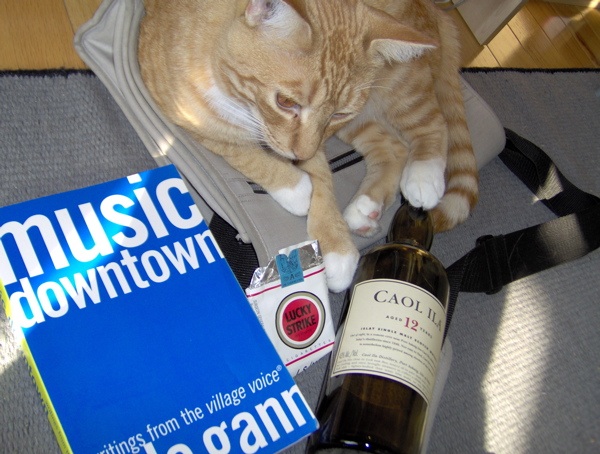
But I have a different interpretation. The way I see it, reading Music Downtown educates a feline, or anyone else, in the rewards of the well-spent Downtown life. Replace those Lucky Strikes with a box of Padron cigars, and Mr. Bojangles will have "imbibed," so to speak, the book in exactly the spirit in which I wrote it. (Or is that spirits?)
[T]here are still modernist philosophical experiments in art since the end of art, as if modernism had not ended, as indeed it has not in the minds and practices of those who continue to believe in it. But the deep truth of the historical present, it seems to me, lies in the Age of Manifestos being over because the underlying premiss of manifesto-driven art is philosophically indefensible. A manifesto singles out the art it justifies as the true and only art, as if the movement it expresses had made the philosophical discovery of what art essentially is. But the true philosophical discovery, I think, is that there is really no art more true than any other, and that there is no one way art has to be: all art is equally and indifferently art. The mentality that expressed itself in manifestos sought in what is supposed was a philosphical way to distinguish real art from pseudo-art, mush as, in certain philosophical movements, the effort was to find a criterion for distinguishing genuine questions from pseudo-questions... [I]n the period of competing manifestos, declaring that something was not - was not really - art was a standard critical posture. It was matched in the philosophy of my early education by the declaration that something was not - not really - philosophy. The best such critics would allow would be that Nietzsche - or Plato, or Hegel - might have been poets. The best their counterparts in art might allow is that something which was not really art was illustration, or decoration, or some lesser thing. "Illustrational" and "decorative" were amongst the critical epithets of the Age of Manifestos.- Arthur Danto, After the End of Art, pp. 34-35
I quote from this book not because the ideas are new to me. On the contrary, I wrote in the Village Voice in 1990 that "no one spouts manifestos anymore because their inherent conservatism has become almost transparent," and in 1992 that "'must' follows 'music' only in the dictionary." "Let us have bad composers and good within each idiom," I continued in that latter instance, "but no more excommunications." No, besides the fact that he states the case so eloquently, I quote Danto because
1. The last time I read ideas such as these was in the 1980s, when they were still controversial, on the defensive, and bore the burden of proof. It is interesting to read Danto's 1997 statement from a calmer and more cognizant perspective, with more of the details filled in and the overall trajectory clearer; and,
2. Because it interests me that someone coming from visual art can write in such depth about the current situation in that field using terms that are just as applicable to music. What little contact I've had with art professors and art classes in recent years had impressed me with the vast differences between current music and current painting. Painting today seems subject to constant scrutiny for political meaning, and to call for such scrutiny, so hedged around with deconstructionism and identity politics as to preclude the innocence of a single brushstroke. By contrast, most music today (though certainly not all) strikes me as floundering for a new syntax, and for ways to assimilate all the new technological advances available. Music seems to me caught in abstraction at the moment no matter how much it yearns to incorporate politics; painting seems trapped in the political sphere, no matter how much it would occasionally just like to be painting. But at least insofar as Danto has summed up the current philosophical dilemma in art, the two, refreshingly, appear to have completed the same revolution in tandem.
And as Danto opens here, modernism has indeed not ended in the minds and practices of those who continue to believe in it, especially within academia. There are still composers who tell students that 20th-century music needs to be heavily chromatic (the fact that this is no longer the 20th century holding no sway with them); that music that is not notated in great detail is "not serious" (music's answer to "merely decorative"); that improvisation is the best music because it is "risk-taking"; that an age of "anguish" demands a music that expresses anguish; that electronic music in which the composer didn't sculpt every sound individually with Max/MSP or Supercollider is not real electronic music. These people's opinions of what music must do are no more than idiosyncracies, to be humored or cast aside as such as the situation requires. And it's good to see Danto delineate the philosophical context for that point as though it is now no longer daringly heretical, but the merest common sense.
Postmodern singer-songwriter extraordinaire Corey Dargel has submitted a photo of his cat next to Music Downtown. The only problem is that his cat looks so much like my Ruby that skeptics are likely to conclude that they are the same cat. But if you compare the markings, you can see that Corey's cat is more spotted, Ruby more swirled:
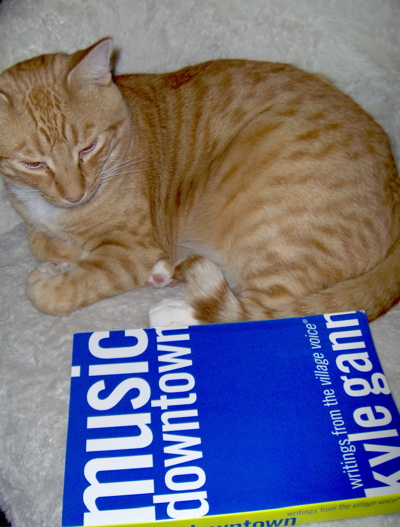
Thanks to all those who submitted photos of their cats with Music Downtown, but since some of those animals are clearly not cats, and the books ranged anywhere from Sun-Tzu's The Art of War to Pat Robertson's The New Millennium, none of them were within the guidelines. [Note to Glenn Branca: if you think it's not obvious that that's you in the cat suit, you're kidding yourself.] Still, all who entered will receive a complimentary copy of my new book, Uptown Music Sucks.
I'm not a violent or a cat-photographing person, but sometimes a man can just be pushed too far.
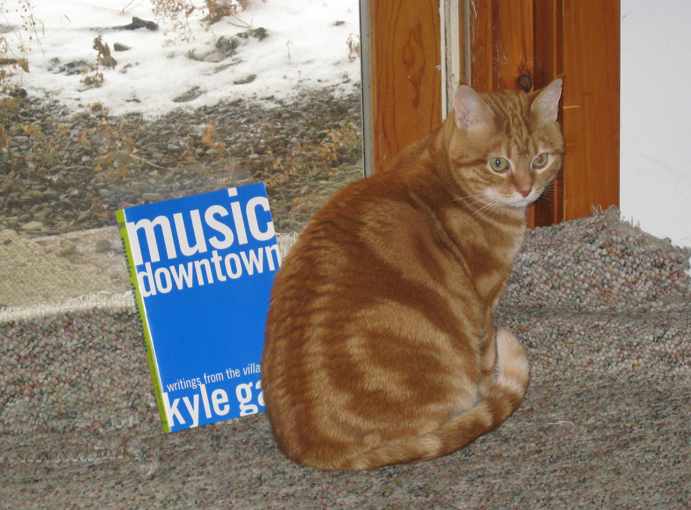
UPDATE: My son helpfully points out that it looks like I just Photoshopped my book into a generic picture of a cat. The physical setup is admittedly odd: the book is leaning against a sliding glass door whose bottom frame is hidden by a piece of carpet used as a mud-guard that tends to curl up at the door. If you look closely you can see the top of the book reflecting in the glass. It would have been nice if Ruby (the cat is named for the guy who shot Lee Harvey Oswald) had sat there patiently while I rearranged the mud-guard, but I was lucky just to get him to sit next to my book. He hates Downtown music, preferring Purrcell.
...and I've always wanted to do something with this 1989 photo of Conlon Nancarrow giving a remarkably young and thin Kyle Gann a tour of a 16th-century convent in the Mexican town of Tepoztlan. For awhile Conlon and his wife Yoko (who took the snapshot) had a country home near Tepoztlan, and took me out with them to stay there. In a Tepoztlan restaurant I had one of the two best meals of my entire life: a mole dish with a shimmeringly complex sauce that contained 19 ingredients. I came home from that trip and wrote a tempo canon for two pianos, or piano and tape, at a 23:24 ratio, titled The Convent at Tepoztlan.
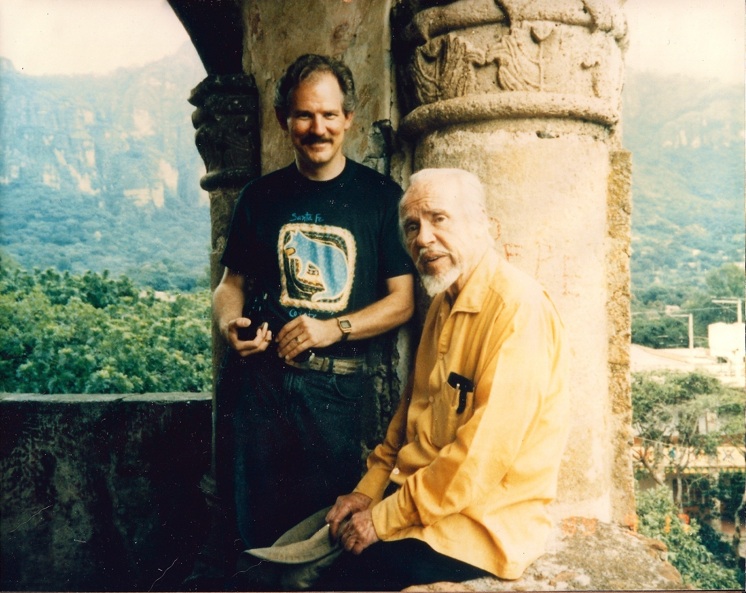
The other unforgettable meal was at a restaurant called Gatto e Volpe in Florence.
It's pretty far down in the comments now, so I didn't want it to get lost that Wiley Hitchcock's son Hugh has started a remarkably honest blog about his late father, with a standing invitation for people to post their memories of him there.
I finally got a recording of my piano concerto Sunken City - by recording it off of Dutch radio via the internet:
First movement: Before (7:43)
Second movement: After (22:19)
The recording is of the premiere in Rotterdam, which had a few more mistakes than the next evening's concert in Amsterdam, but the spirit of it is quite nice. The ensemble is the Orkest de Volharding, the crackerjack wind and brass ensemble founded by Louis Andriessen in 1972, conducted by the young but impressively expert Finnish conductor Jussi Jaatinen. The soloist is Geoffrey Douglas Madge, an Australian pianist living in Amsterdam since the '70s. Few I talk to in the U.S. have heard of him, but he long ago recorded the complete Busoni piano music for Philips, and gave the Chicago premiere of Sorabji's massive Opus Clavicembalisticum in the mid-'80s, so he's been a big figure on my radar screen for a couple of decades. It was a great honor to have worked with him, and I found him a kindred spirit and a convivial conversationalist. Here's a photo of him rehearsing just before the premiere (the other half of the ensemble is outside the picture frame):
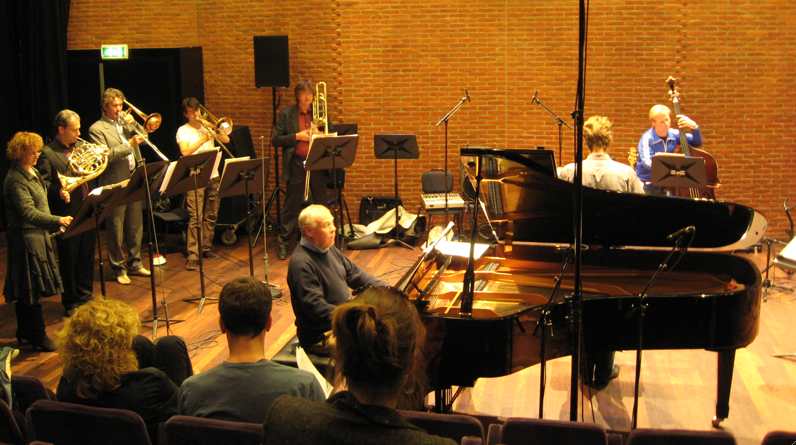
Of course, I got blasted in the local Amsterdam Picayune by the same critic whom all the Dutch composers hate because he's blasted them as well. The only stated complaint was that the piece was too long, which is the most superficial kind of comment; I have tried, throughout my critical career, to avoid ever simply calling a piece too long, because that doesn't mean anything. If Tristan isn't "too long" at four hours, how can anything shorter be "too long"? What a decent critic would say instead is something about the structure of the piece that makes the overall form unwieldy. Typically such a work will be unclearly articulated, with too much sectional variety to grasp as a large structure. But in this case, the long second movement is a simple alternation of tutti sections and piano solos, ABABA in that respect after a short introduction of piano chords. It is also a chaconne, one of the simplest of forms, interrupted by a jazz section quoting Jelly Roll Morton's "Dead Man's Blues," and returning at the end to the opening chords in a freer order. The chaconne does contain 17 chords, because I needed at the beginning to suggest the seeming eternity of New Orleans victims waiting for help. I have my qualms about the work's orchestration, transitions, and other details, but there is nothing about it I am more certain about than that it is not too long. (While composing I even found the piece getting too large and compressed some sections.) And no composer in the world knows better than I do exactly what such reviews are worth.
Much more to the point, probably, is that the second movement is rather sad and Romantic, and as one experienced Amsterdammer warned me, "The Dutch critics don't like sentimentality." The piece is, I'll remind you, an homage to and memorial for New Orleans. I've already blogged the program notes, so won't repeat them here. You can download a PDF score here if you want.
I have a didactic point to make about the performance. You will notice that some of the solos are rather jazzed up, with tasteful pitch bends. I did not notate these. They are, generally speaking, exactly what I wanted. The Volharding players, being smart and sensitive musicians, inferred from the nature of the music precisely what would sound appropriate and played it creatively and in the right spirit. I didn't coach them on that at all - they were already playing it that way when I arrived. So much for the Midtown fallacy that every nuance has to be exactly notated or no one will know how to play your music. Many Pulitzer- and Grauwemeyer-winning composers would say that my score to Sunken City is "undermarked," and thus "unprofessional" - and yet a European ensemble, who had never heard my music before, divined exactly the degree of looseness that would make me happy, and achieved it with no input from me. How is that possible? Surely I can't be right in what I've been saying for twenty years, that if you write music clearly enough you can trust smart, sensitive performers to play beyond the notation to find the right feel for the music? Or does this performance, perhaps, prove the orchestral hotshots' mandate about notational exactitude to be the ideological horseshit it's always been?
With that in mind, enjoy.
UPDATE: Friend John Luther Adams provides a comforting thought: "Your piece isn't too long. That critic is too short."
Peter Cherches has written, for NYU's Fales library, a research guide to Downtown music, concentrating on the years 1971-1987. I started at the Village Voice in 1986, so this is yet more confirmation that the Downtown scene existed and was well recognized as such long before I came along and started writing about it. In order to get more data from readers, he's also started a blog on the subject. At the Voice I covered the "classical," more new-music side of the scene, but Cherches covers the jazz and punk rock areas as well. Got a problem with Downtown music? Take it up with Peter Cherches now. Go tell him there's no such thing.
I was in Washington, D.C., this week lecturing at Catholic University, and I spent a number of fruitful hours at the impressive National Museum of the American Indian. Among other things, I bought a book on Cherokee astrology: The Cherokee Sacred Calendar by Raven Hail, an elder in the tribe. It seems that Cherokee astrology - apparently based on or descended from the Mayan system, which I wasn't familiar with - is based on a 260-day Venus cycle. Venus is the morning star for 260 days, then it's the evening star for 260 days. This 260-day period is divided into 13 periods of 20 signs and 20 periods of 13 numbers. The signs of the Cherokee zodiac are:
Turtle
Whirlwind
Hearth
Dragon
Serpent
Twins
Deer
Rabbit
The River
Wolf
Raccoon
Rattlesnake Tooth
Reed
Panther
Eagle
Owl
Heron
Flint
Redbird
Flower
These signs run by, one a day, sunrise-to-sunrise, in a 20-day cycle. Meanwhile, the 13 numbers go by in a concurrent 13-day cycle.
For instance (and you need to look at the book's appended ephemeris to find out where your birthday fits in), I'm a Wolf and a 6. The Wolf, according to Hail, is "a two-way personality - genial to his own kind, but savagely protective against all outsiders. Lover of freedom and the wide open spaces. A 'don't fence me in' character. The paradox here is that he marks his own territory aggressively, fencing others out!" And as a 6, I'm "an incurable romantic, in pursuit of the true, the good, and the beautiful." Fair enough.
Let's try Stockhausen, since he's on everyone's mind. Assuming he was born after sunrise, he's a Flint and a 12. Flint is "a creator, an originator, an innovator. Opener of The Way to new pathways. He has a keen mind and a lively curiosity to explore beyond the confines of the status quo.... He inspires mental expansion in others, and stretches the mind to the outside limits of any capability in physical and spiritual development. He changes the static to the dynamic." A 12 is one who "spiritually turns on the light, turns up the heat, and starts the motor running."
OK, pretty cute. But if you know how I think, and know what kinds of things I like to write about here, you can anticipate what intrigues me about this. It's that idea of conceptualizing time as cycles out of phase with each other, so that a series of 20-day "months" and 13-day "weeks" are interacting and influencing each other as they go by. And on top of that, the 260-day Venus cycle encompassing them is off kilter with the more obvious 365-day sun cycle and 28-day moon cycle. It's a more strictly numerological system than European astrology, because it reduces to 13 x 20 even though the Venus cycle isn't exactly 260 days, because there's a regular daily progression, and there are no retrograde planets. I love thinking of the Cherokees or Mayans having kept track of the passing of time via these overlapping, out-of-sync rhythmic cycles. And since family legend has it that my great-great-grandmother was a Cherokee, I almost wonder if my love of these cycles is sparked by some ancestral memory stored in a bit of DNA. (The story is that my great-great grandfather married a Cherokee woman, and his siblings were so horrified that they came from Arkansas to Oklahoma and kidnapped my great-grandfather so he wouldn't be raised by an Indian. Family lore, can't confirm any of it. And my mother's father was supposed to have been a bank robber in Louisiana, or so Grandmother said.)
If I had run across this information 20 years ago, I'm sure I'd have at least one Cherokee-inspired piece of music based on the 20 x 13 grid by now. I no longer compose so strictly, but I'll keep the idea in mind.
....In February 1913, Malevich assured Matiushin that "the only meaningful direction for painting was Cubo-Futurism." In 1922 the Dadaists celebrated the end of all art except the Maschine-kunst of Tatlin, and that same year the artists of Moscow declared that easel painting as such, abstract or figurative, belonged to an historically superceded society. "True art like true life takes a single road," Piet Mondrian wrote in 1937. Mondrian saw himself as on that road in life as in art, in life because in art. And he believed that other artists were leading false lives if the art they made was on a false path. Clement Greenberg, in an essay he characterized as "an historical apology for abstract art" - "Toward a Newer Laocoön" - insisted that "the imperative [to make abstract art] comes from history" and that the artist is held "in a vise from which at the present moment he can escape only by surrendering his ambition and returning to a stale past." In 1940, when this was published, the only "true road" for art was abstraction. This was true even for modernists who, though modernist, were not fully abstractionists: "So inexorable was the logic of the development that in the end their work constituted but another step towards abstract art...."
To claim that art has come to an end means that criticism of this sort is no longer licit. No art is any longer historically mandated as against any other art. Nothing is more true as art than anything else, nothing especially more historically false than anything else. So at the very least the belief that art has come to an end entails the kind of critic one cannot be, if one is going to be a critic at all: there can now be no historically mandated form of art, everything else falling outside the pale....
- Arthur C. Danto, After the End of Art, pp. 27-28
And again:
Contemporary art... has no brief against the art of the past, no sense that the past is something from which liberation must be won, no sense even that it is at all different as art from modern art generally. It is part of what defines contemporary art that the art of the past is available for such use as artists care to give it. What is not available to them is the spirit in which the art was made. [Emphasis added in both cases.]
- ibid., p. 5
Arthur Danto is an excellent philosopher of art whose work has sometimes inspired me creatively. What he means by "the end of art," I should clarify, which event he dates roughly to the 1970s, is not the cessation of meaningful artistic creation, but the end of a monolithic cultural conception of art that grew in the early 15th century. And I take pleasure in reiterating his most concise conclusion: No art is any longer historically mandated as against any other art. "There can now be no historically mandated form of art." Not everyone knows it yet - but we have indeed turned a corner.
Europeans certainly do make a composer feel at home. No sooner had I stepped off the plane in Copenhagen than the Bureau d'Exchange handed me several pictures of Carl Nielsen:

In Basel I turned in my Danish Kronens for pictures of Arthur Honegger:

And the Swiss went the Danes one better: not only was their most famous composer on the front, but the reverse of the Swiss Franc sported an actual excerpt (a mere repeated dyad, admittedly, but all the more characteristic withal) from Pacific 231 (detail only):
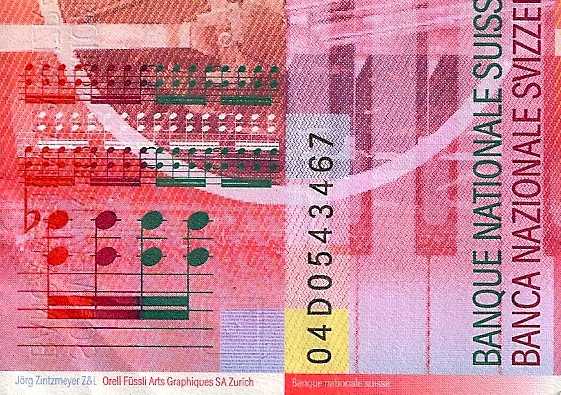
Somewhere around here I have an old, pre-Euro, five-Franc note bearing a likeness of Claude Debussy, but I elected not to bring home the soon-to-be-extinct British twenty-pound note with a drawing of Sir Edward Elgar. The exchange rate being what it is, $46 USD seemed a little dear for the author of Pomp and Circumstance.
I'm out of town on a teaching gig, which is perhaps why the news eluded me that my friend and mentor Wiley Hitchcock passed away Wednesday. It seems terribly unfair that death could ever be associated with such a big, bluff, jovial, good-natured, generous, straight-shooting bear of a guy, as jaunty, masculine, and bullshit-deflecting as a sea captain. He was the dean of Americanist musicologists, and far more than a musicologist - he seemed a full-fledged denizen of the world of American composers, someone who walked among Ives, Thomson, Cowell as a friend and equal, clarifying what they meant and finishing up their business for them. Wiley (what a perfect name for him, more to do with the coyote than with anything "wily") and I used to have lunch in Manhattan together about once a year, and he'd tell me about all the work he was doing on the score to Four Saints in Three Acts, or in getting together the new edition of every last Ives song. He gave you the feeling that musicology was a real "man's game," not for the faint at heart. Then he came down with cancer of the larynx a couple of years ago and our last lunch got postponed, with recurring promises that it would happen eventually - but it never did.
There is no one to whom I am more professionally indebted. He wrote me countless recommendations, badgered professors to hire me and publishers to consider my book proposals, and allowed me to write the post-1980 chapter of the fourth edition of his classic textbook Music in the United States (which, with his usual self-effacing humor, he invariably referred to by its near-acronym MinUS). He treated me like a favorite nephew (or so it felt), and I worshipped him like an uncle known for glorious exploits.
I have to record the one influence I can say I had on Wiley. Once we had lunch at the seafood restaurant (we always had seafood) at Grand Central Station. He broke it to me that he wasn't going to put out a fourth edition of MinUS. Nobody seemed interested in ordinary music history anymore, he said, everyone was doing "reception history," and feminist history, and deconstructionism, and there wasn't any room anymore for someone to simply record events. "But Wiley," I responded, "just because people are getting interested in all these different ways of doing history doesn't mean that traditional history will come to an end. Someone still needs to write down the basic record of what composers wrote and when." He grew thoughtful, and within a few months I got word that MinUS was back on track. What I wouldn't give for another one of those expansive lunches with their wide-ranging conversations through the world of American music.
UPDATE: Stockhausen has died, too.
UPDATE: And Andrew Imbrie and Cecil Payne and Carlos Valdés and András Szöllösy.
Sites To See
AJ Ads
AJ Blogs
AJBlogCentral | rssculture
Terry Teachout on the arts in New York City
Andrew Taylor on the business of arts & culture
rock culture approximately
Laura Collins-Hughes on arts, culture and coverage
Richard Kessler on arts education
Douglas McLennan's blog
Dalouge Smith advocates for the Arts
Art from the American Outback
For immediate release: the arts are marketable
No genre is the new genre
David Jays on theatre and dance
Paul Levy measures the Angles
Judith H. Dobrzynski on Culture
John Rockwell on the arts
innovations and impediments in not-for-profit arts
Jan Herman - arts, media & culture with 'tude
dance
Apollinaire Scherr talks about dance
Tobi Tobias on dance et al...
jazz
Howard Mandel's freelance Urban Improvisation
Focus on New Orleans. Jazz and Other Sounds
Doug Ramsey on Jazz and other matters...
media
Jeff Weinstein's Cultural Mixology
Martha Bayles on Film...
classical music
Fresh ideas on building arts communities
Greg Sandow performs a book-in-progress
Harvey Sachs on music, and various digressions
Bruce Brubaker on all things Piano
Kyle Gann on music after the fact
Greg Sandow on the future of Classical Music
Norman Lebrecht on Shifting Sound Worlds
Joe Horowitz on music
publishing
Jerome Weeks on Books
Scott McLemee on books, ideas & trash-culture ephemera
theatre
Wendy Rosenfield: covering drama, onstage and off
Chloe Veltman on how culture will save the world
visual
Public Art, Public Space
Regina Hackett takes her Art To Go
John Perreault's art diary
Lee Rosenbaum's Cultural Commentary
Tyler Green's modern & contemporary art blog
